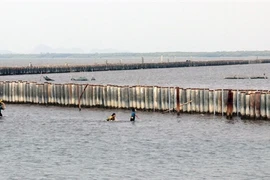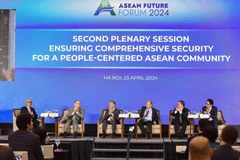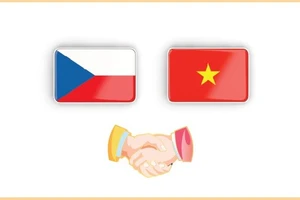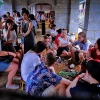Jakarta (VNA) – The Association ofSoutheast Asian Nations (ASEAN) has issued a joint statement on strengtheningresilience to disasters with detail commitments on the occasion of the 7thsession of the Global Platform for Disaster Risk Reduction 2022 (PG 2022) heldin Bali, Indonesia, on May 23-28.
ASEAN countries agree to strengthen the group’s capability to adapt to andrecover from multi-hazards through the implementation of ASEAN SHIELD, andadvance cross-sectoral collaboration and intra-regional collaborative networkwith relevant centres or institutions in ASEAN and beyond, in developing earlywarning systems and strategic foresight for disaster prevention, mitigation,preparedness and capability and capacity building.
They also agree to enhance engagement and partnerships with all relevant ASEANsectors to strengthen contribution towards the effective implementation ofASEAN Comprehensive Recovery Framework (ACRF), as well as strengthen multi-layeredand cross-sectoral disaster risk governance to enhance disaster resilience.
ASEAN will continue to ensure inclusion and integration of disaster resilienceand management agenda into sustainable development and climate adaptation policiesand strategies at regional, national, local, and community levels, whilefurther enhancing national and local capacity in undertaking measures to prevent,mitigate, prepare for, respond to and recover from disasters.
The group will further increase financial resiliency to deal with disastersthrough continuing building ex-ante risk financing and risk transfercapabilities of ASEAN countries through ASEAN Disaster Risk Finance andInsurance (ADRFI) programme; strengthen Southeast Asia Disaster Risk InsuranceFacility (SEADRIF); enhance resiliency of micro, small and medium enterprises(MSMEs); and broaden the base for financing and resource mobilisation ofexisting ASEAN disaster funding mechanisms.
Besides, ASEAN further encourage people’scontribution and a whole-of-society approach in supporting post-disasterrecovery efforts, and look forward to the establishment of a mechanism toenable the peoples of ASEAN to contribute to natural disaster assistance in theregion.
ASEAN also agreed to intensify efforts in utilising science, technology andinnovation (STI) in building disaster resilience in the region; promote opendata and data sharing; enhance early warning systems; advance infrastructureresilience; promote the implementation of ecosystem-based Disaster RiskReduction (Eco-DRR); and forge stronger partnerships and collaboration withASEAN’s partners.
ASEAN countries vow to realise the ASEAN vision to be a global leader indisaster management through exchanging and sharing ASEAN knowledge, experienceand best practices in strengthening disaster resilience with internationalcommunities; and contribute to global efforts on disaster resilience./.
ASEAN countries agree to strengthen the group’s capability to adapt to andrecover from multi-hazards through the implementation of ASEAN SHIELD, andadvance cross-sectoral collaboration and intra-regional collaborative networkwith relevant centres or institutions in ASEAN and beyond, in developing earlywarning systems and strategic foresight for disaster prevention, mitigation,preparedness and capability and capacity building.
They also agree to enhance engagement and partnerships with all relevant ASEANsectors to strengthen contribution towards the effective implementation ofASEAN Comprehensive Recovery Framework (ACRF), as well as strengthen multi-layeredand cross-sectoral disaster risk governance to enhance disaster resilience.
ASEAN will continue to ensure inclusion and integration of disaster resilienceand management agenda into sustainable development and climate adaptation policiesand strategies at regional, national, local, and community levels, whilefurther enhancing national and local capacity in undertaking measures to prevent,mitigate, prepare for, respond to and recover from disasters.
The group will further increase financial resiliency to deal with disastersthrough continuing building ex-ante risk financing and risk transfercapabilities of ASEAN countries through ASEAN Disaster Risk Finance andInsurance (ADRFI) programme; strengthen Southeast Asia Disaster Risk InsuranceFacility (SEADRIF); enhance resiliency of micro, small and medium enterprises(MSMEs); and broaden the base for financing and resource mobilisation ofexisting ASEAN disaster funding mechanisms.
Besides, ASEAN further encourage people’scontribution and a whole-of-society approach in supporting post-disasterrecovery efforts, and look forward to the establishment of a mechanism toenable the peoples of ASEAN to contribute to natural disaster assistance in theregion.
ASEAN also agreed to intensify efforts in utilising science, technology andinnovation (STI) in building disaster resilience in the region; promote opendata and data sharing; enhance early warning systems; advance infrastructureresilience; promote the implementation of ecosystem-based Disaster RiskReduction (Eco-DRR); and forge stronger partnerships and collaboration withASEAN’s partners.
ASEAN countries vow to realise the ASEAN vision to be a global leader indisaster management through exchanging and sharing ASEAN knowledge, experienceand best practices in strengthening disaster resilience with internationalcommunities; and contribute to global efforts on disaster resilience./.
VNA






























